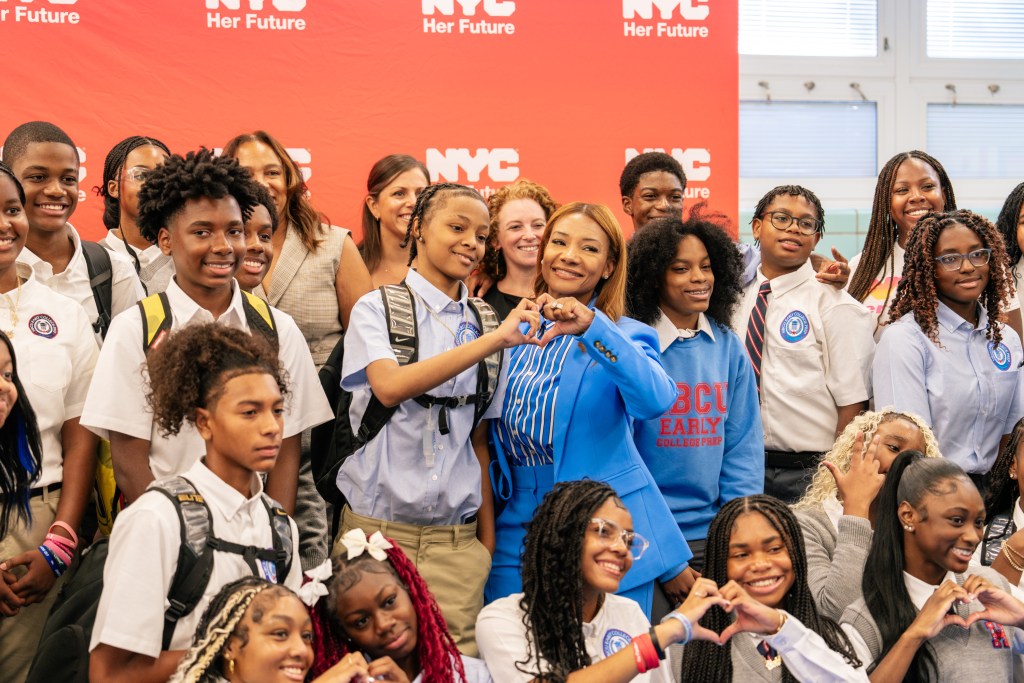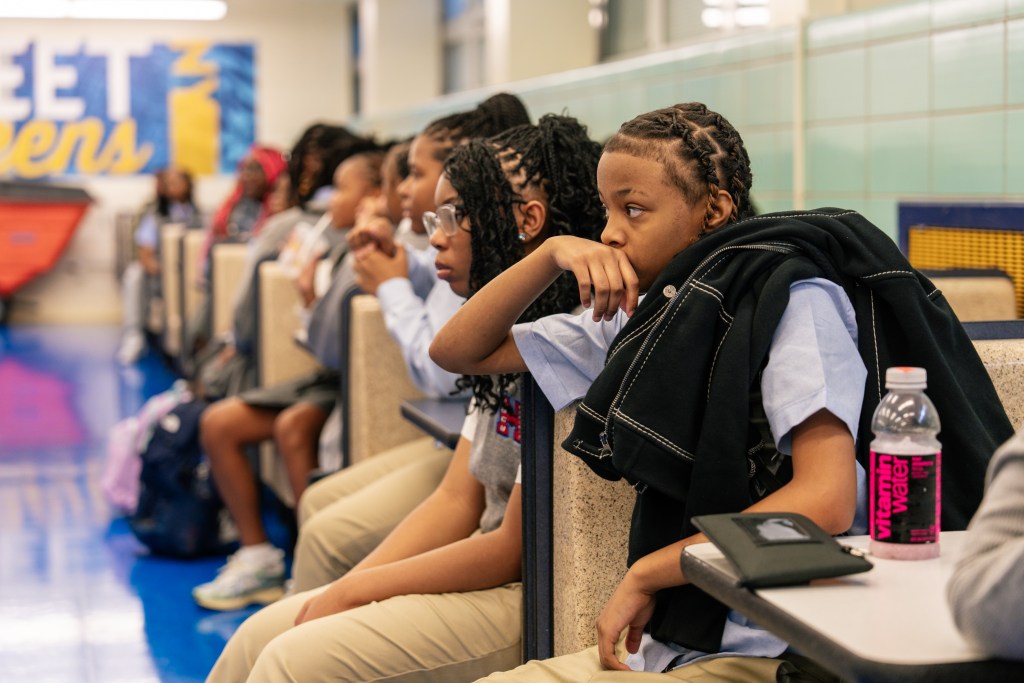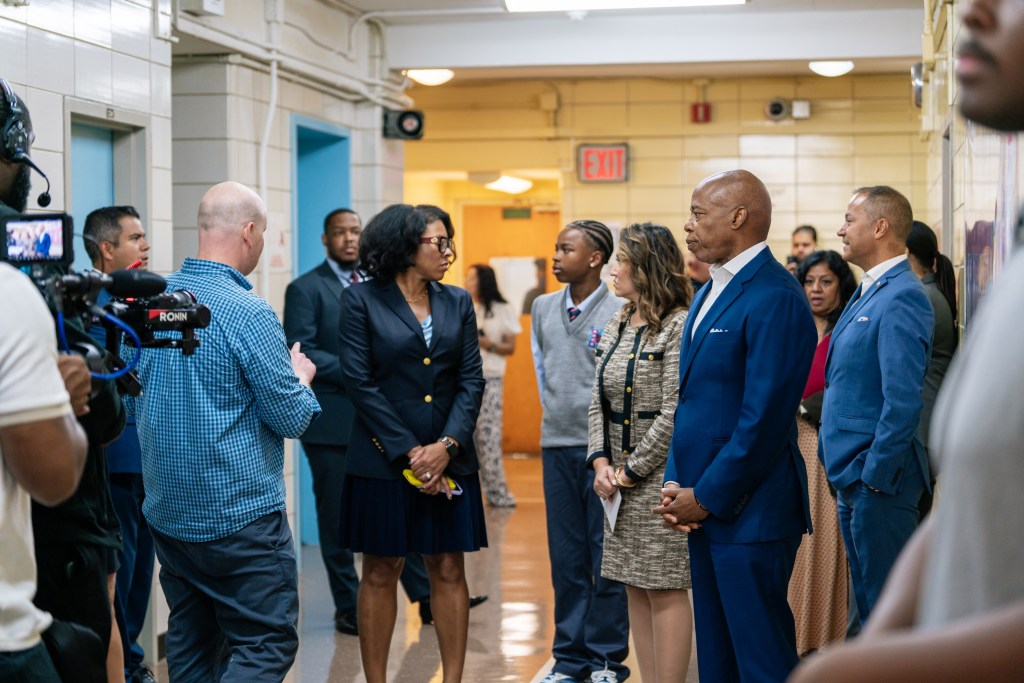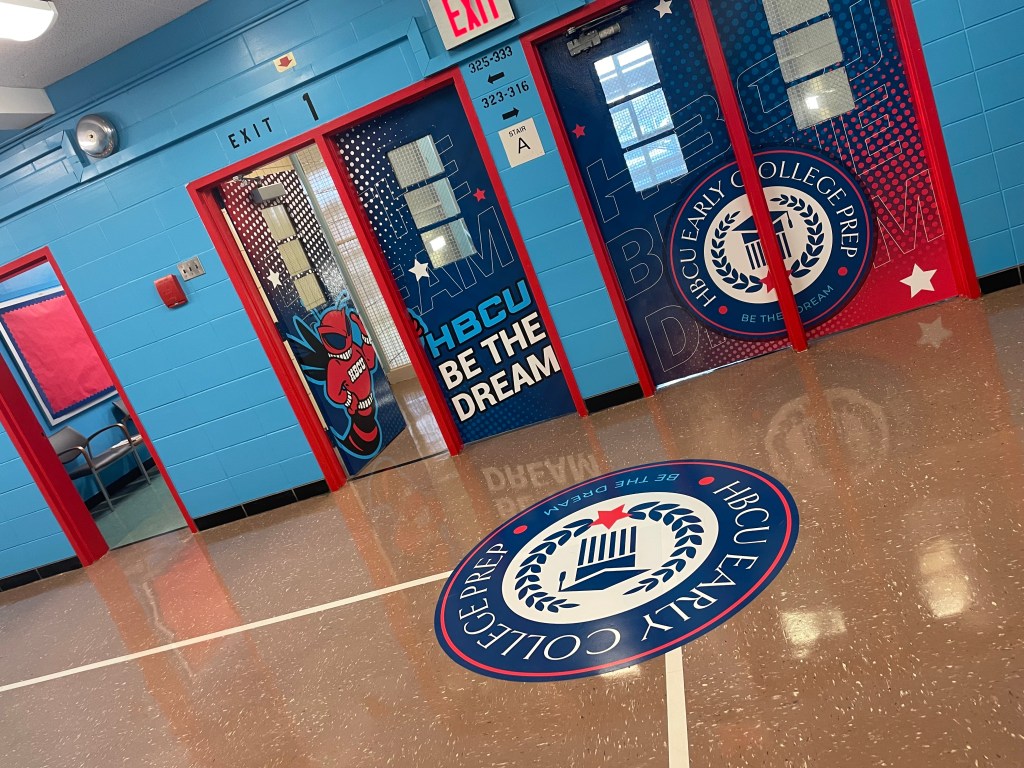For Dr. Asya Johnson, access to quality education for Black students is most important.
“We have to start right now to be able to not only give them a quality education, but give them the experience so that they can see what they can be. [The] more exposure that they see people in fields where people look like them, the more competent they feel to go out and pursue these careers,” Johnson said about her students.
Earlier this month, the doors of HBCU Early College Prep opened—New York’s first college prep high school focused on Historically Black Colleges and Universities (HBCUs). The tuition-free school, in South Jamaica, Queens, on the third floor of I.S. 238—Susan B. Anthony Academy—came together as part of the vision of Johnson when she proposed the idea in 2023. Fast-forward two years and she is now known as the “HBCU Principal.”
This kind of path was not likely for Johnson, given her journey early in life. As a young girl growing up in North Philadelphia in the 1980s during the height of the crack epidemic, she lived with her mother, who was heavily addicted. She often had to fend for herself, being in seven different elementary schools by the second grade and also living in a four-bedroom shack with nothing but a queen-size bed while her mother would get high. She was then raised by her father, who she says instilled a strong work ethic in her, and also by her stepmother.
 : HBCU Early College Prep Principal Dr. Asya Johnson making a heart symbol with other 9th-grade students. Sept. 4, 2025. Courtesy of HBCU Early College Prep
: HBCU Early College Prep Principal Dr. Asya Johnson making a heart symbol with other 9th-grade students. Sept. 4, 2025. Courtesy of HBCU Early College Prep
 caption: The 9th-grade students are the inaugural class of HBCU Early College Prep and will have been joined by three new classes by the 2028-2029 academic year. Sep. 4, 2025. Courtesy of HBCU Early College Prep
caption: The 9th-grade students are the inaugural class of HBCU Early College Prep and will have been joined by three new classes by the 2028-2029 academic year. Sep. 4, 2025. Courtesy of HBCU Early College Prep
It wasn’t until Johnson’s senior year in high school that she met a woman who introduced her to what an HBCU was and paid for her to attend an HBCU tour, which completely changed her trajectory. She ultimately found Delaware State University (DSU) to be the perfect fit.
“I walked into a place where I felt welcome and loved and affirmed,” Johnson said. “My professors cared very much about me. Failure was not an option. I lead with that as an expectation, and I’m very clear with my students that 100% of you are going to be successful, and that is on everything that I love.”
Johnson also met her husband, Vernon Johnson, a Harlemite who also serves as a school principal, with whom she shares three sons. She later received her doctorate in educational leadership from Drexel University.
After years of working in the NYC Public School system as a principal, aiming to bring opportunities to underserved students, Johnson took the next step in introducing HBCUs to Black NYC students when she proposed the idea of HBCU Early College Prep as part of former Chancellor David Banks’s Master Principal Initiative.
Students can earn up to 64 transferable college credits and, in addition to a high school diploma, earn an associate’s degree plus the option of guaranteed admission to Delaware State, the exclusive partner of the school. They will also be able to take virtual college courses from the HBCU. Up to 30% of Delaware State students come from New York, according to Johnson.
On September 4, the inaugural class of 100 students (9th graders) out of more than 1,000 applicants was greeted by a special First Day of Class ceremony with city leaders, as well as DSU President Tony Allen.
“To be your exclusive academic partner makes me extraordinarily proud, and I know we can do it,” Allen said in his remarks. “We know this approach can work because we’ve seen it work. Hundreds of students are already enrolled at our Early College School in Dover, completing work toward their college degrees.”
 Mayor Eric Adams, Education Chancellor Melissa Aviles-Ramos, in the halls of the school during the first day of class. Sept. 4, 2025. Courtesy of HBCU Early College Prep
Mayor Eric Adams, Education Chancellor Melissa Aviles-Ramos, in the halls of the school during the first day of class. Sept. 4, 2025. Courtesy of HBCU Early College Prep
Defying the odds
“Right past the Checkers, under all the scaffolding” is how one of the ninth-grade student, with his friends on Hillside Avenue, described HBCU Early College Prep.
Parents of the students at the school have been well-engaged and are hopeful it will succeed.
“They have been waiting and advocating for this school before it was even birthed from my mind,” Johnson said on the BlackPactImpact podcast, discussing the community of parents she has encountered in Queens.
Over the last year, Johnson has given presentations about the new HBCU high school at several events in Queens, including pep rallies, community centers, churches, and the Jamaica Branch of the NAACP.
Tia McNeil, 35, is the mother of ninth grader Haylie Jackson, 14, and said she already sees that the school has had a positive impact on her daughter. McNeil works as a nurse and said she wishes she had gone to an HBCU.
“I wasn’t able to experience it, so I feel like this is a great opportunity. I think I’m more excited than her,” McNeil said. “I wanted her to actually be in an environment where she knew that Black people could succeed, that there are other people that look like her, that are in great positions, that can do well in school.”
According to McNeil, the application was made easy. She is hopeful the school will have a positive influence in the community, with how well both the school and the students present themselves, and will inspire neighbors to enroll their kids.
“A lot of these kids are lost in the Black community, and I’m just happy that Dr. J (Principal Johnson) had the vision to do this, because now you’re gonna create a whole culture of the way we’re viewed as Black people,” McNeil said. Her daughter is in the process of rehearsing to become a majorette for the school band.
In 2024, the Black high school graduation rate in NYC was 80%, which is a significant improvement over the last few decades, but there is still a notable gap compared to 89% for white students. Johnson said the biggest issue is that Black students in New York and nationally are not being informed about the benefits of HBCUs.
“Being in all the schools I’ve been in, one thing that I rarely heard talked about or scholars even being interested in was HBCUs, and some of it was this notion that HBCUs were unaffordable to families,” Johnson said. Historically, HBCUs have accepted students with lower grade point averages. Johnson pushes back against the narrative that HBCUs don’t provide scholarships, pointing out that many are available through the schools and resources like UNCF and the Thurgood Marshall Fund.
“Our top kids can get into the Spellmans, Morehouses, and Howards, but we’re not exposing them to it,” she continued.
Data from the UNCF shows that despite only making up 3% of educational institutions, HBCUs are responsible for 80% of Black judges, 50% of doctors and lawyers, 40% of engineers, and members of Congress. Black students are also 40% more likely to graduate when attending an HBCU.
According to Johnson, HBCUs would be a positive alternative to schools in university systems like SUNY, where Black students are typically far away and in an environment with people who do not look like them, and CUNY, where they are often living in the same circumstances as when in high school. In both cases, she says, former students have often ended up dropping out.
“Why not go to a Black college? Why are we taking our intellectual and athletic talents to PWIs (Predominantly White Institutions) when we can go and do those same things at HBCUs?” she asked.
 Hallway where inspirational motto of the school, HBCU Be the Dream, adorns walls. September 19, 2025. HBCU Early College Prep. (Photo by Jason Ponterotto)
Hallway where inspirational motto of the school, HBCU Be the Dream, adorns walls. September 19, 2025. HBCU Early College Prep. (Photo by Jason Ponterotto)
Problem-solving framework
Known sometimes as “HBCU Principal” or to students and staff as “Dr. J,” Johnson fits into the long lineage of Black educators through history, such as Horace Tate and Mary McLeod Bethune, who have played an important role in using education to advance their Black communities. She has spent her career using lessons from her experience in schooling to give opportunities to the Black students with whom she works with.
In junior high school, Johnson was placed in the Magnet Program, a specialized educational program for high-achieving students. However, she said she was not inspired to care about work despite her ability to get good grades, so she chose to leave the program.
“I unintentionally opted myself out of access to college and rigorous coursework by going into an easier program,” Johnson said.
Later, as an educator, she witnessed teachers who only gave Advanced Placement (AP) course access to certain students, while others were always excluded. In thinking about having been a “sassy little Black girl” in school, Johnson wanted to make sure all students had access, including students who were just like her.
“I’ve never been top of my class, but I’ve always had a level of intelligence that was not tapped into,” Johnson said. “I didn’t realize my power until I got older. I wish I would have known the level of intelligence that I have now. I wish someone had tapped me and said, ‘she got it.’”
When she became a principal in the Bronx, Johnson made her 11th and 12th grades take AP classes, because she believes no one person should determine the extent of the quality of work that students are capable of. She says she even dealt with parents who stated their students were not “college material.”
Johnson’s experience made her want to create schools and opportunities where students now don’t have the option to “opt themselves out.”
From 2016 to 2023, Johnson served as principal at Longwood Preparatory Academy in the South Bronx, improving the graduation rate from 44% to 86%, as well as lowering chronic absenteeism from 77% to 32% during her tenure. Before then, she was director for special education programs in District 79, which served incarcerated students in Rikers Island and Passages Academy.
In 2022, Johnson was acknowledged for her work when former Chancellor David Banks selected her as part of his 2023–2024 Master Principal Initiative. She is also an adjunct professor at NYU.
Students at HBCU Early College Prep, who are referred to as Scholars, are actively engaging in problem-solving activities, being given examples of issues in government and researching ways to solve those problems, which Johnson said may be pitched to City Council members. This method of teaching students to think critically and become change agents comes from Johnson’s adoption of educator Zaretta Hammond’s “Ready to Rigor” framework in her book “Culturally Responsive Teaching & the Brain,” which she encourages other educators to read.
Professor Christina Stevens-Payne, who teaches an AP Seminar, said that right now, they are all focused on fulfilling the mission for the students.
“It’s something that doesn’t have the foundation completely built yet, because it’s been a month, and everything up to this point has been more abstract, and now it’s reality. It’s kind of like building a plane, but flying it at the same time,” Payne said.
Having taught for 22 years in Cambria Heights, Bushwick, and Briarwood, Payne said HBCU Early College Prep spoke to a higher calling than other schools in her career.
“(Principal Johnson) has created the stepping stones to actualize that mission or vision that she has created for the Black community,” Payne said. “HBCU universities and colleges are a foundation of our education system, and they need to be utilized in developing our youth.”
The African proverb “Ubuntu,” which means “I am because we are,” has been a message Johnson has routinely shared with the school as a collective vision.
Scholars at the school are divided into four houses that are like fraternities and are named for HBCUs: Howard, Hampton, North Carolina A&T, and Clark Atlanta.
Student Cavani John, who is in the Howard house, is taking Algebra 2, traditionally an 11th-grade class. He has interests in athletics and computer science. While he says he hadn’t known much about HBCUs before learning about this school, he is now enjoying the supportive community.
“We’ve made the right choice. HBCU is a journey to success,” John said in remarks at the First Day of School event. “Opportunities, mentorship, academic excellence, discipline, and—most importantly—a fun-loving environment are what we will continue to build at this school.”
Like this:
Like Loading…
Related
